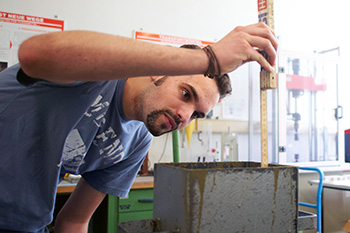
Civil Engineering
In a Nutshell
Profile
The program equips future civil engineers with comprehensive basic knowledge in all technical disciplines of sustainable building. Students can also learn special subjects in the specialization area of "structural engineering" and "infrastructure planning". They will work on real problems from professional practice. In this manner, they can familiarize themselves with design, planning, and construction processes. They get to know the economic and social issues connected to the profession and gain experience with the international nature of the construction industry.
Practical Training
Basic internship
A 12-week construction site internship is integrated into the program in which the students work hands-on on the site and get to know everyday work there. It must be completed in a non-lecture period. We recommend completing at least part of the internship before the program starts. Subject-specific vocational training and proof of practical work before the start of the program can be counted towards the degree.
Required internship
The required internship usually takes place in the fifth semester of the program. It spans a contiguous period of 20 weeks. Of this, 18 weeks are pure full-time practical training and 2 weeks of courses to accompany the internship. In the required internship semester, students work on construction, planning, consulting, and construction operation tasks based on specific tasks in construction companies, architecture, engineering, and expert firms and/or agencies. They gain insights into technical and organizational contexts in businesses, firms, and/or agencies as well as on construction sites. The university has good contacts with businesses and will help students find a suitable internship position.
External content
Structure of the Program
In the first program segment, theoretical engineering basics are taught in two theoretical semesters. This provides first insights into the core subjects of civil engineering. Modules in the first program segment include:
- Mechanics and statics
- Infrastructure planning
- Surveying
- Foundations of sustainable building
- Technical drafting and CAD
- Construction and structural engineering
- Materials science
At the end of this program segment, students can also change to the branch of "Energy Efficient Building Design B.Eng.".
The second program segment covers five semesters. The third and fourth semesters cover:
- Statics
- Geo-technology
- Material-independent foundations of measurement
- Traffic and water systems
- Construction management planning
- Construction operations
The required internship falls on the fifth semester.
The sixth and seventh semesters are designed for specialization in the branches of study of "construction engineering" and "infrastructure planning". In addition, students take core subjects, such as business administration or construction law, and carry out interdisciplinary projects.
Construction engineering covers:
- Solid construction
- Wood and steel construction
- Construction geo-technology
Infrastructure planning covers:
- Street and traffic development
- Water development and urban water management
- Dam and landfill construction
In the seventh semester, the students also write their Bachelor’s thesis.
Curriculum and Examination Regulations
The [program plan]*provides an overview of the structureof the program. The [module manual] describes the contents of the individual subjects. The [study and examination regulations]* form the legal basis for the study program. Contact your academic advisor Prof. Dr. Egbert Keßler concerning the content of the program.
*only available in german at the moment
Job Perspectives

The country needs civil engineers! The opportunities for attractive work places are better than ever. Compared to the future needs for engineers, there are currently far too few graduates. 150,000 civil engineers will be needed in the coming years in Germany alone.
Civil engineers work mainly in...
- The construction industry and construction trade
- Engineering firms
- The construction departments of businesses
- Public service
- Research, development, and testing institutions, and
- Professional associations
Master's degree
After completing the Bachelor’s degree, good graduates have the possibility of obtaining further qualifications with a Master's degree in "Sustainable Planning and Design M. Eng.". In cooperation with Bamberg University, Coburg University also offers a Master’s in "Heritage Sciences M.A." and "Digital Technologies in Heritage Conservation M.A.".
Campus.Design Open
Once a year, the students organize the "Campus.Design Open” exhibit for the Campus Design show. They present their work from the past semesters. In addition, there are public courses, workshops, lectures, tours through the buildings, music and a lot more...
External content
Application and Admission Requirements
Here you can find all the important information about evaluating your school-leaving certificates and learning German in order to start a bachelor program at the University of Coburg.
Since the program is taught in German, you also have to prove your knowledge in German before the start of studies (level C1/C2).
